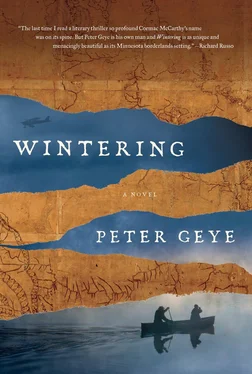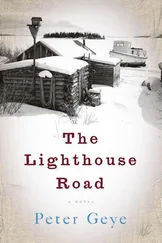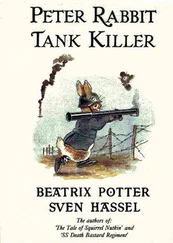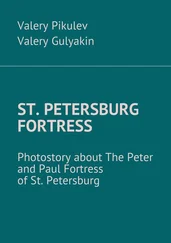“Why didn’t she ever come down? What’s wrong with her?”
Then Gus would straighten up and take another twenty steps before he’d rest again. One hand always freezing, because he had to switch the mitten back and forth, a great annoyance.
“Nous étions trois capitaines, / de la guerre revenant / brave, brave / de la guerre revenant bravement,” he sang, his voice half croaking and half wheezing.
Snow fell in streamers throughout the windless day. Gus could hardly tell when he’d come out of the woods onto a lake. He’d walk and rest and walk and rest and for most of that day he was on a lake bearing east. As night gathered, he thought he saw lights in the distance.
“There are tracks, my son! There are tracks ! Gus, mon fils ! Please, stop. My boot. I’ve lost my boot!”
Perhaps it was merely a trick of the darkness, but the snow seemed to fall even harder as night came on. Gus — hoarding the last handfuls of dried fruit for a more desperate stretch of miles — had eaten only snow for twenty-four hours. He’d been walking for the last sixteen. His body no longer ached. It was no longer even a part of him. But it kept moving. It kept moving, and then they were in a tangle of frozen reeds alongshore.
“There were snakes, Gus. Mon fils! You missed their tracks. All across that lake. I believe they are following us. The ice is cracking, Papa! It’s coming apart.”
Now the snow was relenting, and sometime that night the sky unfolded its light and Gus could see they were on a frozen river. He turned to look at his father in the moonlight. He had removed the sleeping sack and bearskin. His jacket was unbuttoned and he’d even taken off his red hat. Gus stepped out of the harness and went back to the canoe. His father’s lips had split and bled and now were frozen. He looked like a corpse. Gus found the canteen but the water, too, had frozen. He would have wept if he’d been alive. But for the fourth time he had died on the borderlands. And he had killed his father. They were both dead.
He then looked at his hand in the moonlight. It was the same color as the moon itself and hurt like hell. He opened his coat and put his hand in his armpit, and he was not dead, because he was bleeding. His shoulders were bleeding and his shirt was soaked with icy blood. He covered his father again with the sleeping sack and the bearskin and then stepped back into the Duluth pack and walked on, the river purling beneath his feet, giving the melody to the song he now sang: “Par ici t’il y passe trois cavaliers barons, Dondaine, don, dondaine, don, / Que donneriez-vous, belle, Qui vous tir’rait du fond? Dondaine, don, dondaine, don…” At some point he imagined — or maybe heard — his father singing along with him.
THERE WERE last days on the borderlands, of course, and for Gus and Harry the end was also the beginning. Of the river, that is.
Its headwaters were frozen. The canopy of trees spanning its shorelines arched above in a snow-covered tangle, a high tent. He came to it in the late afternoon and thought of setting camp — he’d slept only a few hours for two nights and had little to eat beyond a moose’s fare of twigs and grass and bark, the fruit still in the canoe — but the mere thought of pitching the tent and building a fire sent him walking forward in a different sort of suffering.
As evening fell the river spread before him and the snow gave way to coursing water. He stood at the shore and considered the dark current flowing into the twilight. Was this the Burnt Wood River? Was such a thing even possible? He took out his father’s book of maps and opened it to chart 8, the facsimile of Thompson’s map of the lake and the river’s headwaters. Gus studied it longingly, as though by sheer force of wishing he could place himself on that page and in doing so save them both.
Since he had no paddle, he found a log as big around as his arm and as tall as he was, settled into the canoe, and used it to push off the shore.
The water under the keel ferrying him along was the sweetest sensation he’d ever felt, and it revived him before lulling him to something like sleep. He ought to have feared the saults and rocks and icy shores stretching before him as inevitably as the next hour, but he had no thoughts left to use. Or anyway no worries. What would come would come. It had been coming and it came and it would keep coming.
His father was sleeping. At least Gus hoped he was. Surely the sound of the water, warbling and piping and gently lapping against the canoe, was a song to set a man asleep. And the pull of that same water beneath the canoe? It was as if Morpheus was pouring it to seduce his dreamers.
Gus rode the canoe through the night, in and out of sleep as the boat bumped against rocks or the soft snow banked alongshore. At times the river was wider and slower or narrower and faster, but in either case it was doing his work for him, and for this he was more grateful than he’d ever had occasion to be. And the day broke to a bright sunrise through the trees as they sailed toward it.
Gus filled the canteen and guzzled the water and he filled it again and scooted up to his father, who was unconscious. The water merely leaked through his beard onto the frozen bearskin. So Gus settled back in the stern and covered his eyes with his arm. He slept, and then woke when the canoe was caught in a slurry of snow and ice above a frozen lake. Gus pushed for the bottom with the log pole, and after an hour’s hard work and the very last of his strength he had the canoe on solid ice and moving across that small lake. He could have sworn, looking onto its shores, that he’d slept there once upon a time. When he reached the far end of the lake the river opened again and he sat himself down and the canoe floated on.
The rest of that day the river flowed up through the keel of the canoe and into his spine and then through his mind, and his mind was flooded and would remain afloat for many, many years to come. He slept and dreamt of the water now and felt flooded. Not drowning, just coursing through him. Near dark, he woke as the canoe came to a slow and sliding stop, and he heard in the absence of its movement a waterfall, thunderous or perhaps not. Conceivably, it was instead all the water that was washing through him.
But what was unmistakable and certain — and proved by the story as it was later told to him — was the whining of snowmobiles. He tried to open his eyes but could not. He could not even open them when he heard voices familiar and gentle and strong coming through the gloaming. It was the last time Gustav Eide would be that far up the Burnt Wood River until his father went walking early this winter.
YOU’RE NOT DEAD until you’re warm and dead. That’s what they say about hypothermia. When I saw Harry the night he was brought out of the woods, he looked more than warm — he looked like a burn victim. And I couldn’t believe he was not dead. Not even for all of the medical equipment and the doctor and nurses that surrounded him at the Gunflint hospital.
I had sneaked up there after dark to see for myself what was being whispered in town: that he and Gus had been delivered by the Riverfish brothers, and that Harry would not survive the night.
The tip of his nose and his cheeks above his beard were frostbitten, blistered, and red. He was covered from ankles to chin by an electric blanket. One foot was covered, the other elevated and being treated by a nurse. His faintly orange ankle deepened through peach, umber, rust, and brown until it finally turned black near where his toes used to be. When the nurse saw me — it was Ana Olsson — she smiled and covered his foot and stepped out from behind the curtain.
Читать дальше












